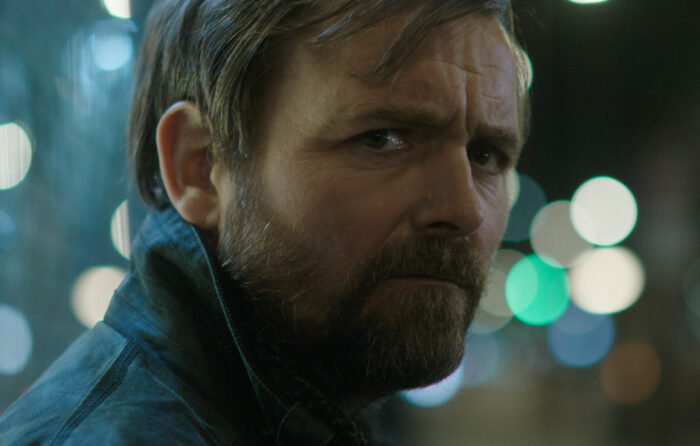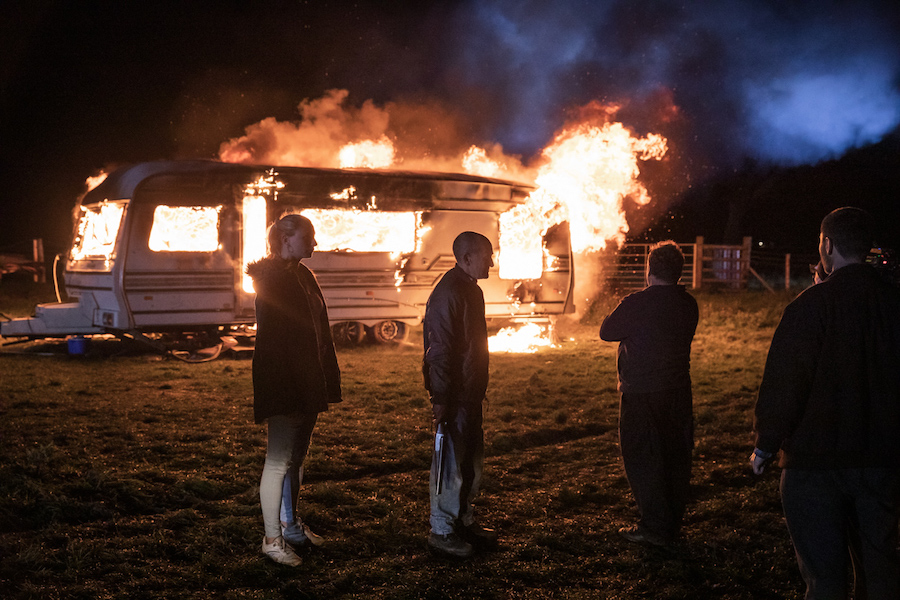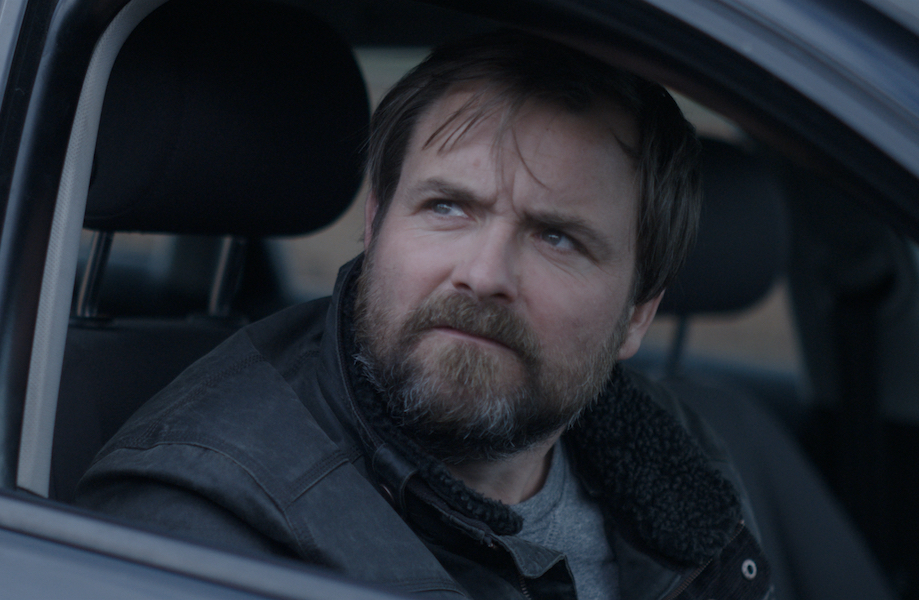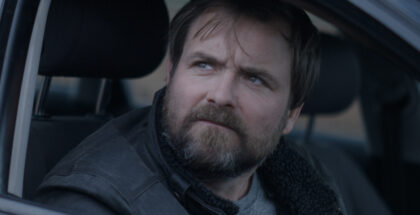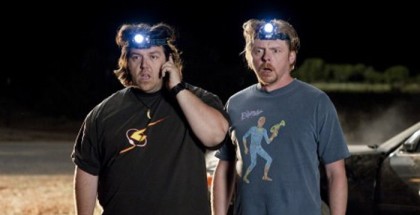Interview: Neil Maskell, Paul Andrew Williams talk Bull
Josh Slater-Williams | On 09, Apr 2022
Following his BAFTA-nominated breakthrough feature London to Brighton (2006), writer-director Paul Andrew Williams dabbled in horror-comedy and thriller territory with The Cottage (2008) and Cherry Tree Lane (2010). Then came a fairly surprising switch to inspirational drama with Song for Marion (2012), the sweet tale of a grumpy pensioner honouring his recently deceased wife’s passion for performance by joining her former local choir. Williams has kept producing films and directing television – including Broadchurch, A Confession and The Eichmann Show – but Bull is his first feature as director to play on the big screen in nearly a full decade.
It’s a striking return to the mode of film he first broke out with, while also expanding his palette with a slippery, supernatural edge to proceedings. British character actor favourite Neil Maskell takes centre stage as the eponymous Bull, who returns to his home town after a decade’s absence. Once an enforcer, he’s seeking violent revenge on former gangster associates, including David Hayman’s Norm and Tamzin Outhwaite’s Sharon, who double-crossed him all those years back.
With Bull out now, we chat to Andrew Williams and Maskell about the thriller and the current state of British independent film. (Note: Williams joined this interview, which took place at the 2021 London Film Festival, partway through.)
Neil, how did you come on board the project?
Neil Maskell: I met Paul years ago, I think through Johnny Harris who’s a friend of mine, who did London to Brighton. I love London to Brighton, I thought it was great. Love Lorraine Stanley in that film, as well. And then we did a pop video. I don’t think Paul called me, somebody else called me and said, “Oh, Paul Andrew Williams wants to work, he’s doing a pop video for James Lavelle” – founder of Mo’ Wax, he was in Unkle, but I think it was James Lavelle solo stuff that we did. We did one those videos for it where the video stops and there’s a bit of dialogue and stuff, one of those kinds of things. So, we did that and then we stayed mates. I went to screenings of Song for Marion and Cherry Tree Lane. I’ve always loved the way he works and his work. He kept saying, “Oh, I’ve got a few things, and we will end up doing something substantial together one day.” And then I bumped into him in town and he mentioned this, but like anything, funding and other projects and scheduling get in the way. And then in a sense, I suppose the Covid-19 pandemic put both of us in a position where we could do it… well, no, that makes it sound like it was a good thing! But it did mean that our schedules all worked. He said, “I’ve got this part for you” and sent over the script. And that was Bull.
“Paul said it’s a version of High Plains Drifter…”
Were you made aware of the fantastical elements before reading the script?
Maskell: Paul said it’s a version of High Plains Drifter. And I knew that film and went back and watched it again to get a refresher. I think he said that before I read it. For a start, I was interested in it because it is kind of a Western, with a supernatural element. So, I sort of knew that and I was surprised, actually, at how well he carried that off, because it could be fucking ridiculous. It’s not, it really works. I think what is human and empathetic about the film, somehow, is that supernatural element.
Paul, you’ve been very busy with TV during the last 10 years. How has it been doing your first cinema release film again?
Paul Andrew Williams: You never think you’ll be in a cinema. You just make it and see what happens. It might just be on DVD at my own house. The thing is it both is and isn’t by choice. I like telling stories, man, being a part of and making things. And I think that if you’re lucky enough to do it and someone’s going to pay you to do it and provide the money, then you do it wherever. You want people to watch it, that’s the thing. With TV, obviously you’re going to get a bigger audience; millions. But I’ll work on a good story wherever it is.
Were there any conventions of revenge films you were hoping to maybe subvert or avoid with this?
Williams: You’re making a revenge film, so it’s got Dead Man’s Shoes all over it. I watched Get Carter again. Other than that, I didn’t really watch anything else. I’ve seen Dead Man’s Shoes but I can’t watch it because it freaks me out too much.
“I’ll work on a good story wherever it is”
How do you feel about so many reviews of Bull bringing up Dead Man’s Shoes?
Maskell: It’s a high accolade to be compared to Dead Man’s Shoes. It’s a great movie.
Williams: With Neil being in it, it’s going to get compared to Kill List. Even though I haven’t seen Kill List, because, again, I’m too fucking scared to watch it. But whenever we’re talking about anything, it’s much easier if you have a comparison to go, “Oh, it’s like that. It’s like that but better,” or whatever.
There was one early review quote I liked, which was this: “By the time the credits roll, it’s hard not to feel compelled to take a shower, sit in a dark room by yourself and cry, or some combination of the two.”
Maskell: Well, you can get those sit-in showers now. But that’s mainly for old people.
How is it balancing that tone of thrills laced with tragedy?
Williams: Tricky, man. The truth of the situation is you want someone who feels an urgency to locate his family, but also, someone getting hurt is horrible. It’s just the truth of the scenario. It’s not played for violence, is it? The violence is instinctive. It’s not like he plans a big move.
Maskell: No. It’s very difficult to watch the film and not be slightly overwhelmed by the moments of violence that are in it. But hopefully it subverts expectations in the sense that it humanises the perpetrator to some extent that, by the end, you’re on his side or at least empathise or sympathise with him. Despite the violence he wreaks.
With those grisly moments, when it comes to shooting them, is there an element as an actor of having to desensitise yourself?
Maskell: Well, normally – and this is a bit of a disappointing answer generally for journalists – the bits of violence in stuff, or any kind of effects work, is where filming gets the most technical. And where the effort actually is in making sure that when you are doing the stuff that is so technical, that you’re still invested in it emotionally, and you’re still invested in it from a performance point of view so that it doesn’t just become about the practicalities of what it is you’re doing. So far from having to desensitise yourself, you have to do the opposite of that to make sure that stuff is still invested with something, because otherwise all you’re concentrating on are the health and safety aspects of it. From my understanding of people that have done a lot of sex scenes, it’s the same thing. It’s actually incredibly technical and a bit horrible and awkward, and you have to remind yourself to make it look convincing.
“Cinema screens are eaten by big franchises, so it’s difficult to make independent film”
How do you both feel about the state of British independent cinema at the moment?
Maskell: I suppose it’s difficult, isn’t it, like it always is. We’ve got a common language with America. Most people, when they want to go and see a film in English, will go and see an American film. You’re always struggling against that and always have been. Cinema screens are sort of eaten by the big franchises. And so, it’s difficult to make independent film. You used to be able to sell DVDs, now you can’t. And the big streamers, your Netflix and your Amazon, it’s not like they’re into treating filmmakers particularly well. So, it’s very, very difficult to get films made, get films funded, get people to watch them. And, if I’m really honest, how many British films did I go to the cinema to see last year? And I’m invested in it. I’ve got fucking dogs in the race and still I probably only saw two or three. But it’s that, it’s difficult. It’s an uphill battle to get stuff made and it’s great when you can and when you do and when, hopefully like this, they do find an audience.
Williams: Even a small audience. For me, a small audience for something good is better than a big audience for something shit.
What have you both been watching lately?
Maskell: I saw Philip Barantini’s Boiling Point the other night, which is absolutely fucking amazing.
Williams: I don’t like watching anything else because there’s loads of stuff out there that’s better than me and I don’t like it. Makes me feel massively insecure. No, but to be honest, I watch a lot of documentaries.


